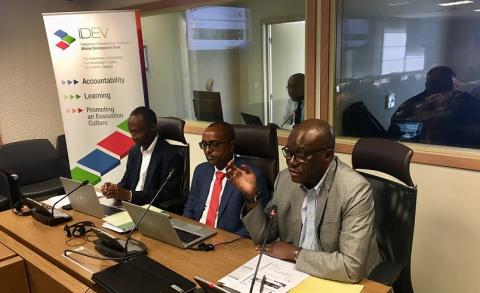
Agriculture is the backbone of many economies in Africa and one of the top sectors of interventions of the African Development Bank – with planned investment of over US $24 Billion over the next 10 years through its Feed Africa Strategy.
Agricultural Value Chains (AVCs) have become very important in linking farmers to African emerging economies and ensuring that “no one is left behind”. They are important not only in developing sustainable agricultural system, but also in alleviating poverty and promoting financial inclusion, especially of the rural poor and enhancing country export competitiveness.
Following IDEV project cluster evaluation on Agricultural Value Chains Development (AVCD) to be submitted to the African Development Bank Board of Directors in March 2018, IDEV and the Agriculture, Human and Social Development Complex at the African Development Bank held a learning event “Capitalization Workshop on the IDEV Evaluation of AfDB’s Support to Agricultural Value Chain Development in Africa” on Monday 26 February 2018 to discuss the main evaluation findings and lessons learned for guiding the design and implementation of AVC projects under the Bank's Feed Africa Strategy.
The evaluation key lessons learned are:
- A comprehensive AVCD analysis is necessary at project design level and its subsequent adaptation during implementation
- AVCD interventions that focus heavily on increases in commodity production without sufficiently considering efficiency of the production system and the value chain as a whole, will incur net financial and economic losses
- AVCD interventions require realistic planning that takes into account appropriateness of scope in terms of the time required for contributory activities to mature, Value Chain actors chosen for support,scale of activities responsive to the market demand, and sequencing of activities
- Deliberate, concerted and targeted efforts at all stages of AVCD design and implementation are essential to ensure inclusiveness. Processes that ensure participation, and mechanisms for equitable benefit sharing enable meaningful inclusiveness
- AVCD interventions requires a comprehensive package of support that ensures partnerships with private sector, government and other development actors
Following the presentation by IDEV, an open exchange between IDEV and operations staff ensued. There was a general agreement about the evaluation results.
Issues of concern that emerged during the exchange include: Balancing profitability with the development objectives of AVC projects; The effective management of co-financing infrastructures related to AVC projects; Limited and appropriate lessons learned for informing AVC project design; appropriate strategies for the effective participation of women and youth in AVCs; and multi-commodity- versus single commodity-based AVC.
To further assist with the design the next generation of AVC projects under the Feed Africa Strategy a request for a similar but more granular evaluation ( i.e disaggregated by commodity, type of project) was made to IDEV.
Over 20 staff across IDEV and the Agriculture, Human and Social Development Complex at the Bank attended the workshop.

